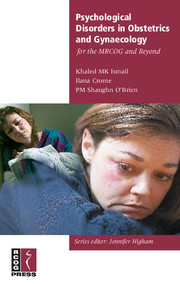Book contents
- Frontmatter
- Contents
- Abbreviations
- Introduction
- 1 Diagnosis and management of psychological problems
- 2 Basic science
- 3 The menarche
- 4 The menstrual cycle
- 5 Psychological aspects of infertility and its management
- 6 Pregnancy and the puerperium
- 7 Eating disorders
- 8 Menopause and perimenopause
- 9 Substance use disorders
- 10 Other disorders
- Further Reading
- National organisations and support groups
- Index
4 - The menstrual cycle
Published online by Cambridge University Press: 05 July 2014
- Frontmatter
- Contents
- Abbreviations
- Introduction
- 1 Diagnosis and management of psychological problems
- 2 Basic science
- 3 The menarche
- 4 The menstrual cycle
- 5 Psychological aspects of infertility and its management
- 6 Pregnancy and the puerperium
- 7 Eating disorders
- 8 Menopause and perimenopause
- 9 Substance use disorders
- 10 Other disorders
- Further Reading
- National organisations and support groups
- Index
Summary
Introduction
The menstrual cycle commences with the maturation of the hypothalamo-pituitary-ovarian axis. At menarche each ovary contains about 300 000 primordial follicles. Once maturation has commenced, follicles proceed to either maturation or atresia; the latter is the fate of the majority. The high luteal phase levels of progesterone produced by the corpus luteum resulting from ovulation are blamed for most of the physical and behavioural premenstrual symptoms. At least one premenstrual symptom occurs in 95% of women during the reproductive age. The physical symptoms (mastalgia, bloatedness) have also been attributed to progesterone through induced fluid retention. However, there is now much evidence to suggest that this is not true.
Premenstrual syndrome
Premenstrual syndrome (PMS) is a psychological and somatic disorder of unknown aetiology. Hormonal and other, possibly neuroendocrine, factors probably contribute. There has been a reluctance, until relatively recently, to accept PMS as a serious condition. This has arisen because of a general failure to distinguish true PMS from the milder physiological premenstrual symptoms occurring in the normal menstrual cycle of the majority of women.
DEFINITION
A woman can be diagnosed as having PMS if she complains of recurrent psychological or somatic symptoms (often both), occurring specifically during the luteal phase of the menstrual cycle and resolving by the end of menstruation. These symptoms must be so severe that they disrupt the woman's normal functioning, quality of life and interpersonal relationships. Symptoms must have occurred in at least four of the previous six cycles.
- Type
- Chapter
- Information
- Publisher: Cambridge University PressPrint publication year: 2006
- 3
- Cited by



